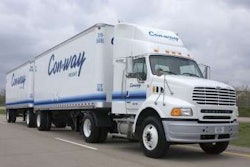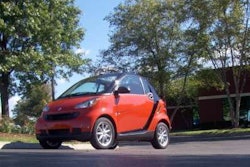Volvo Trucks equipped with engines that comply with tighter 2010 U.S. Environmental Protection Agency emissions regulations will have many advantages over current EPA-certified diesels, says Scott Kress, senior vice president of sales and marketing for Volvo.
But one big advantage that’s not received a lot of attention is the fact that Volvo trucks equipped with engines with selective catalytic reduction (SCR) systems will not require active regeneration of diesel particulate filters (DPF) during normal highway operating conditions, Kress said today, March 19, during a press conference at the Mid-America Trucking Show in Louisville, Ky.
Kress said that thanks to the 2010 integration of Volvo’s SCR and DPF technologies, passive regeneration cycles will eliminate the need to inject diesel fuel into the DPF to oxidize accumulated soot. “This, of course, results in reduced fuel consumption, reduced thermal cycling of expensive catalysts and lower overall operating costs,” he said. “It also relieves the driver of another responsibility — having to keep track of when an active regeneration needs to take place — and allows the truck to operate in areas where a recently cycled, and hot, DPF would be a safety hazard — indoors or in refineries, for example.”
Kress said the ability to passively regenerate DPFs depends on having the correct concentration of nitrogen oxides (NOx) in the hot exhaust stream flowing into the unit’s filter. NOx enables passive regeneration, and SCR eliminates NOx from the exhaust after it flows through the DPF. “In some cases with test trucks working in real-world applications, we’ve seen the vehicle log more than 45,000 miles without any active regeneration being required,” Kress added. “In addition, another 23 Volvo test trucks have been driven more than 9 million miles without an active regeneration being necessary.”
VEC system now available
In other Volvo news, the company announced that a new, advanced collision control has been developed with Bendix and will be available as an option on Volvo Class 8 trucks and tractors. The system, called Volvo Enhanced Cruise (VEC), is designed to work in conjunction with the truck’s adaptive cruise control system. A sensor located in the truck’s front bumper projects a 16-degree radar cone in front of the truck that can track up to 32 different objects within about 500 feet of the vehicle.
Once the driver turns the cruise control on and sets a speed, VEC maintains a set time gap between the truck and the vehicle in front of it. If the vehicle in front of the truck slows, the system picks up on the decreasing time interval between them and begins to reduce the throttle to compensate. If that is not sufficient to restore the set interval, the VEC then will apply about one-third of the foundation brake capacity, including pulsing trailer brakes. However, VEC always allows the driver the option of applying full brakes at his discretion. The system is proactive enough, however, to bring the truck to a complete stop on its own without driver input should the situation demand such an action.
To maintain driver alertness, the system provides several distinct audible alerts, including warnings for decreased following distance, lane cut-ins and an impending impact alert — even with cruise control turned off. A visual indicator on the Volvo instrument panel allows drivers to quickly learn the speed of vehicles in front of the truck and how quickly the gap between the two vehicles is being closed. VEC is set to maintain a default following time of 2.8 seconds between the truck and a vehicle in front of it — which works out to about 250 feet at 60 mph. An optional upgrade allows drivers to adjust that interval gap at their own discretion.
“VEC combines adaptive cruise control with proactive braking to help drivers avoid collisions,” said Frank Bio, product manager for Volvo Trucks. “It does more than simply give timely warnings to drivers. It also takes action and gives the driver — and other highway users — that much more of a safety advantage.”
America’s Road Team gets VN780
The Captains of America’s Road Team now have a Volvo VN780 at their disposal to help deliver news about the trucking industry and highway safety. The tractor — presented by Volvo to the American Trucking Associations at MATS — will be driven by the Road Team Captains as they transport the new ATA Image Trailer, which is outfitted as a mobile educational and promotional tool for the trucking industry.
“Volvo Trucks’ sponsorship of America’s Road Team and our presentation of this truck for the Road Team’s use demonstrate our deep commitment to safety, a commitment we share with ATA,” Kress said.











